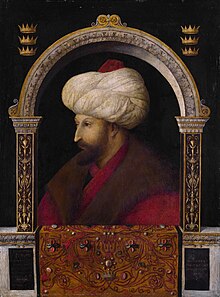Sultan Mehmet II
| Mehmed the Conqueror | |||||
|---|---|---|---|---|---|
| Sultan of the Ottoman Empire Kayser-i Rûm The Lord of the Two Lands and the Two Seas Padishah |
|||||

Portrait of Sultan Mehmet II, 1480, by Gentile Bellini (1429–1507), oil on canvas and perhaps transferred from wood, 69.9 x 52.1 cm. Now at the National Portrait Gallery in the UK.
|
|||||
| 7th Ottoman Sultan (Emperor) | |||||
| 1st reign | August 1444 – September 1446 | ||||
| Predecessor | Murad II | ||||
| Successor | Murad II | ||||
| 2nd reign | 3 February 1451 – 3 May 1481 | ||||
| Predecessor | Murad II | ||||
| Successor | Bayezid II | ||||
| Born | 30 March 1432 Edirne, Rumelia Eyalet, Ottoman Sultanate |
||||
| Died | 3 May 1481 (aged 49) Hünkârçayırı (Tekfurçayırı), near Gebze, Ottoman Empire |
||||
| Burial | Istanbul, Turkey | ||||
| Consorts |
|
||||
| Issue |
|
||||
|
|||||
| Imperial Dynasty | House of Osman | ||||
| Father | Murad II | ||||
| Mother | Hüma Hatun | ||||
| Tughra | |||||
| Full name | |
|---|---|
| Mehmed bin Murad |
Mehmed II (Ottoman Turkish: محمد ثانى, Meḥmed-i sānī; Modern Turkish: II. Mehmed Turkish pronunciation: [ˈmeh.met]; 30 March 1432 – 3 May 1481), commonly known as Mehmed the Conqueror (Turkish: Fatih Sultan Mehmet Han) and also known as Muhammed bin Murad, was an Ottoman sultan who ruled first for a short time from August 1444 to September 1446, and later from February 1451 to May 1481. At the age of 21, he conquered Constantinople (modern-day Istanbul) and brought an end to the Eastern Roman Empire. Mehmed continued his conquests in Anatolia with its reunification and in Southeast Europe as far west as Bosnia. Mehmed is considered a hero in modern-day Turkey and parts of the wider Muslim world. Among other things, Istanbul's Fatih district, Fatih Sultan Mehmet Bridge and Fatih Mosque are named after him.
Mehmed II was born on 30 March 1432, in Edirne, then the capital city of the Ottoman state. His father was Sultan Murad II (1404–51) and his mother Hüma Valide Hatun, born in the town of Devrekani, Kastamonu.
...
Wikipedia
